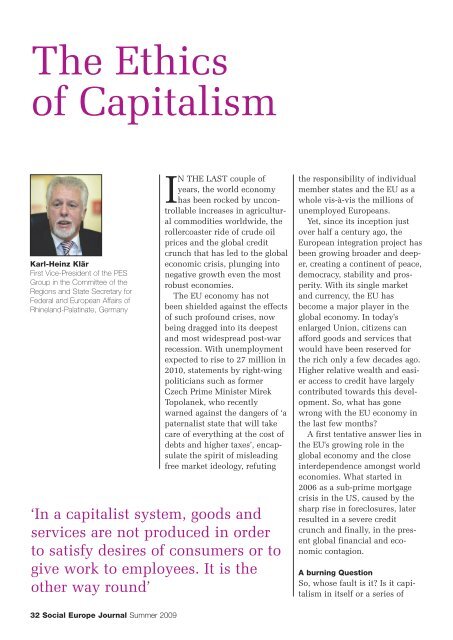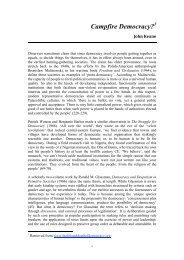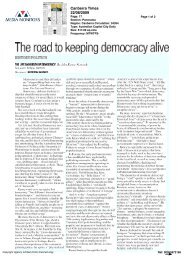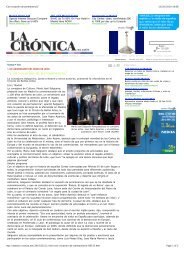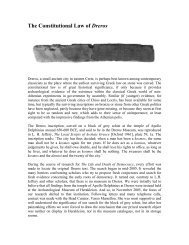The Ethics of Capitalism - Social Europe Journal
The Ethics of Capitalism - Social Europe Journal
The Ethics of Capitalism - Social Europe Journal
You also want an ePaper? Increase the reach of your titles
YUMPU automatically turns print PDFs into web optimized ePapers that Google loves.
<strong>The</strong> <strong>Ethics</strong><br />
<strong>of</strong> <strong>Capitalism</strong><br />
Karl-Heinz Klär<br />
First Vice-President <strong>of</strong> the PES<br />
Group in the Committee <strong>of</strong> the<br />
Regions and State Secretary for<br />
Federal and <strong>Europe</strong>an Affairs <strong>of</strong><br />
Rhineland-Palatinate, Germany<br />
IN THE LAST couple <strong>of</strong><br />
years, the world economy<br />
has been rocked by uncontrollable<br />
increases in agricultural<br />
commodities worldwide, the<br />
rollercoaster ride <strong>of</strong> crude oil<br />
prices and the global credit<br />
crunch that has led to the global<br />
economic crisis, plunging into<br />
negative growth even the most<br />
robust economies.<br />
<strong>The</strong> EU economy has not<br />
been shielded against the effects<br />
<strong>of</strong> such pr<strong>of</strong>ound crises, now<br />
being dragged into its deepest<br />
and most widespread post-war<br />
recession. With unemployment<br />
expected to rise to 27 million in<br />
2010, statements by right-wing<br />
politicians such as former<br />
Czech Prime Minister Mirek<br />
Topolanek, who recently<br />
warned against the dangers <strong>of</strong> ‘a<br />
paternalist state that will take<br />
care <strong>of</strong> everything at the cost <strong>of</strong><br />
debts and higher taxes’, encapsulate<br />
the spirit <strong>of</strong> misleading<br />
free market ideology, refuting<br />
‘In a capitalist system, goods and<br />
services are not produced in order<br />
to satisfy desires <strong>of</strong> consumers or to<br />
give work to employees. It is the<br />
other way round’<br />
the responsibility <strong>of</strong> individual<br />
member states and the EU as a<br />
whole vis-à-vis the millions <strong>of</strong><br />
unemployed <strong>Europe</strong>ans.<br />
Yet, since its inception just<br />
over half a century ago, the<br />
<strong>Europe</strong>an integration project has<br />
been growing broader and deeper,<br />
creating a continent <strong>of</strong> peace,<br />
democracy, stability and prosperity.<br />
With its single market<br />
and currency, the EU has<br />
become a major player in the<br />
global economy. In today's<br />
enlarged Union, citizens can<br />
afford goods and services that<br />
would have been reserved for<br />
the rich only a few decades ago.<br />
Higher relative wealth and easier<br />
access to credit have largely<br />
contributed towards this development.<br />
So, what has gone<br />
wrong with the EU economy in<br />
the last few months<br />
A first tentative answer lies in<br />
the EU's growing role in the<br />
global economy and the close<br />
interdependence amongst world<br />
economies. What started in<br />
2006 as a sub-prime mortgage<br />
crisis in the US, caused by the<br />
sharp rise in foreclosures, later<br />
resulted in a severe credit<br />
crunch and finally, in the present<br />
global financial and economic<br />
contagion.<br />
A burning Question<br />
So, whose fault is it Is it capitalism<br />
in itself or a series <strong>of</strong><br />
32 <strong>Social</strong> <strong>Europe</strong> <strong>Journal</strong> Summer 2009


